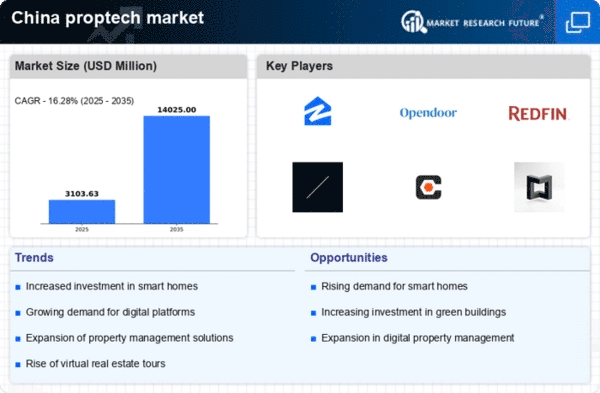Urbanization and Population Growth
China's ongoing urbanization and population growth are significant factors influencing the proptech market. With over 60% of the population now residing in urban areas, there is an increasing demand for housing and commercial spaces. This urban migration is driving the need for innovative real estate solutions that can efficiently manage and develop properties. The proptech market is responding to this demand by offering platforms that facilitate property transactions and management. Moreover, the Chinese government has implemented policies to support urban development, which further stimulates investment in proptech solutions. As cities expand, the need for smart infrastructure and efficient property management systems will likely continue to rise, propelling the growth of the market.
Government Initiatives and Regulations
Government policies and regulations play a crucial role in shaping the proptech market in China. Recent initiatives aimed at promoting digital transformation in the real estate sector are encouraging the adoption of proptech solutions. For example, the Chinese government has introduced measures to streamline property registration processes and enhance transparency in transactions. These regulatory changes are fostering a more conducive environment for proptech startups and established companies alike. Additionally, the government's focus on sustainable development is driving demand for eco-friendly and energy-efficient properties, which proptech solutions can help facilitate. As these initiatives continue to evolve, they are likely to create new opportunities for innovation within the market.
Consumer Demand for Enhanced Experiences
The evolving expectations of consumers are driving change in the proptech market. As individuals become more tech-savvy, they demand seamless and personalized experiences in their real estate transactions. This shift is prompting companies to adopt advanced technologies that enhance user engagement and satisfaction. For instance, virtual reality and augmented reality are being utilized to provide immersive property tours, allowing potential buyers to explore homes remotely. Additionally, mobile applications are streamlining communication between tenants and property managers, improving overall service delivery. The proptech market in China is likely to continue evolving in response to these consumer preferences, as companies strive to meet the growing demand for innovative and user-friendly solutions.
Technological Advancements in Real Estate
The rapid evolution of technology is a primary driver in the proptech market. Innovations such as artificial intelligence, blockchain, and the Internet of Things (IoT) are transforming traditional real estate practices. In China, the integration of these technologies is enhancing property management, streamlining transactions, and improving customer experiences. For instance, AI-driven analytics are being utilized to predict market trends and optimize pricing strategies. The proptech market in China is projected to grow at a CAGR of approximately 25% over the next five years, indicating a robust demand for tech-driven solutions. As these technologies become more accessible, they are likely to reshape the landscape of real estate, making it more efficient and transparent.
Investment Trends in Real Estate Technology
Investment in real estate technology is a significant driver of the proptech market in China. Venture capital and private equity firms are increasingly recognizing the potential of proptech startups, leading to a surge in funding. In 2025, investments in the sector are expected to reach approximately $10 billion, reflecting a growing confidence in technology's ability to transform real estate. This influx of capital is enabling startups to develop innovative solutions that address various challenges within the industry, such as property management, tenant engagement, and transaction efficiency. As more investors enter the market, the competitive landscape is likely to intensify, fostering further innovation and growth in the proptech market.
















